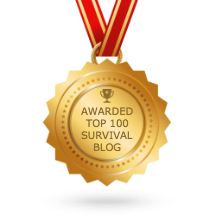Basic items that should be included in your kits are:
- First aid kit (bandages, non--latex gloves, towelettes, etc.)
 Disaster first aid supplies:
Disaster first aid supplies:Wound Care:
Sterile 4×4 gauze-1 package per family
Sterile 2×2 gauze-1 package per family
Clean 4×4 gauze-1 package per person
Clean 2×2 gauze-1 package per person
Large safety pins
Roller gauze-6-8 various sizes
Chemical ice packs
Band-aid style dressings
Butterfly bandages
Elastic bandages various sizes
Spray bottle of saline
Wound tape- paper, surgical tape, plaster
Sterile cotton swabs- 200
Sterilize and ointments:
Neosporin cream-1 per person
Hydrogen peroxide-2 bottles
Isopropyl alcohol- 2 bottles
Topical anti-infective agent) 2 bottles
Topical cream for insect bites etc. (Benadryl)
Tools:
Needle nose
Tweezers
Hemostat
Magnify Glass for removing splinters etc.
 Glass thermometer rectal & oral
Glass thermometer rectal & oralParamedic shears
B.S.I. (Body Substance Isolation)
Vinyl medical gloves -2 boxes
N95 or similar masks- 2 boxes
Plain sanitary napkins- 1 package per person
OTC (over the counter) Medicines
Acetaminophen (Tylenol)
Aspirin
Advil
Stomach Medicines-Pepto Bismol, Prilosec, Imodium AD
Ipecac syrup
Allergy Medicines- Benadryl, Claritin
Hydration:
Pedialyte is great for the entire family.
Prescription Medications:
Every family has their own individual medications or specialty items; be sure to include those in your kit as well. One example is the "Epi-Pen" for a person with severe allergies or asthma. Always keep 30 days of prescription medications you use on an ongoing basis, in your home; don't wait until you run out to refill them.
Include these items in your disaster first aid kit and placed them in a durable container or bag. Check your disaster first aid kit supplies monthly for damage and expiration dates. A lot of first aid supplies like band-aids have a sterile date.
- Bottled water (1 gallon per day, per person is recommended. Stock up enough for at least 3 days)
- Non-perishable snacks and food
- Flashlight w/ batteries
- Portable AM/FM radio w/ batteries
- Whistle
- Emergency ponchos or thermal blankets
- Candles
- Dust masks
- Toiletries (tooth brushes, toilet paper, etc.)
- Plastic bags/trash bags
- Personal medication
- Emergency out-of-state contacts
Emergency response systems may be overwhelmed and unable to provide the community with immediate assistance when disaster strikes. Taking all the necessary steps mentioned above and being prepared with first aid and emergency disaster kits, will keep you and your family comfortable and safe in any unfortunate event. Survival Kits




0 comments:
Post a Comment